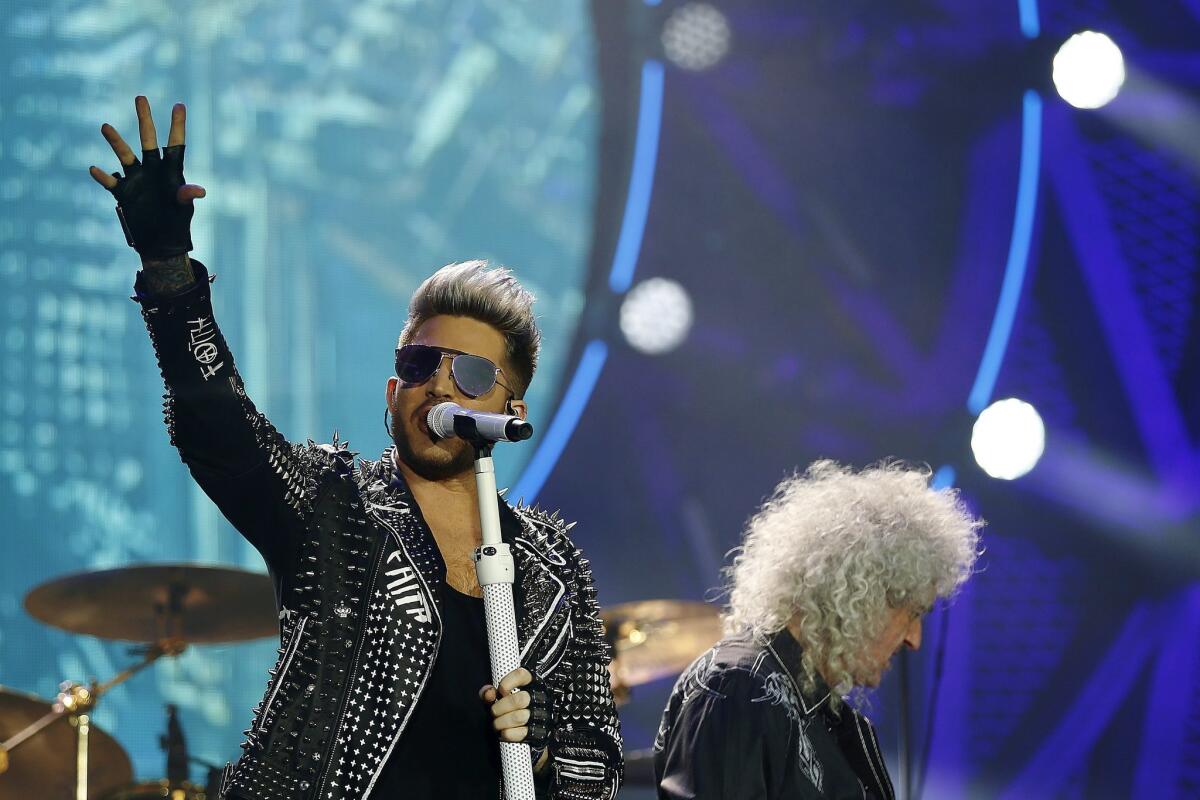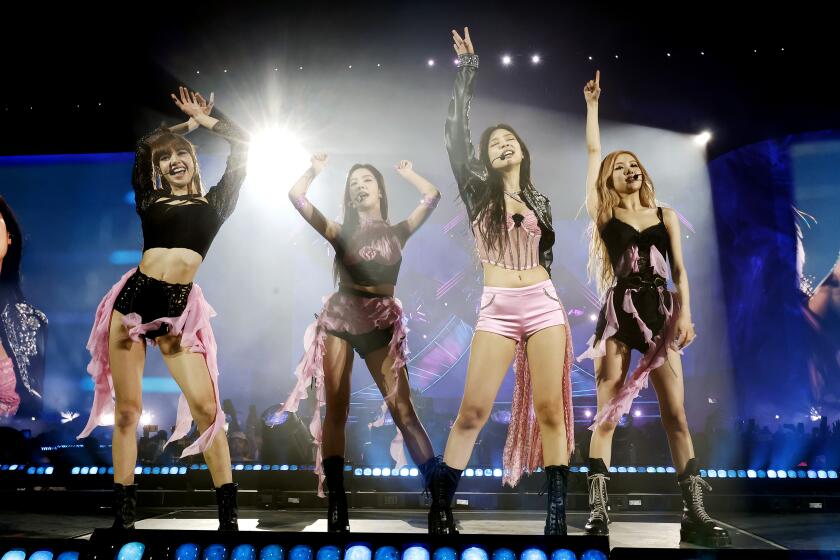Queen doesn’t want the GOP to use ‘We Are the Champions,’ but is the law on their side?

- Share via
British rock band Queen has blasted the GOP and presumptive Republican presidential nominee Donald Trump for using the group’s 1977 rock anthem “We Are the Champions” at the Republican National Convention in Cleveland, charging that neither Trump nor the party is authorized to use the song.
“An unauthorised use at the Republican Convention against our wishes — Queen,” the group posted on its official Twitter account.
The song’s publisher also released a statement complaining that “Sony/ATV Music Publishing has never been asked by Mr. Trump, the Trump campaign or the Trump Organization for permission to use 'We are the Champions' by Queen.
“On behalf of the band, we are frustrated by the repeated unauthorized use of the song after a previous request to desist, which has obviously been ignored by Mr. Trump and his campaign.”
Additionally, singer Adam Lambert, who has been performing with Queen in recent years in the place of original lead singer Freddie Mercury, who died of AIDS complications in 1991, posted a photo of Mercury with the statement: “If your political party spends decades treating gay people as second-class citizens, guess what: You don’t get to use Freddie Mercury’s music at your convention.”
GOP officials countered that they had the right to use the song through a blanket license paid to performing rights organizations to compensate artists, publishers and songwriters for music used at public events.
“Queen does not want its music associated with any mainstream or political debate in any country,” Sony/ATV’s statement added. “Nor does Queen want ‘We Are the Champions’ to be used as an endorsement of Mr. Trump and the political views of the Republican Party. We trust, hope and expect that Mr. Trump and his campaign will respect these wishes moving forward.”
A Sony/ATV spokeswoman said it makes “no difference in how the song was played,” that is, whether a campaign uses an artist’s original recording or has a house band perform it live.
“The fact of the matter is that neither the publisher nor artist gave permission and had previously stated that they did not want Mr. Trump or the campaign to use the song,” the spokeswoman said.
But what about the legal perspective?
“I side with the people that believe that these [uses] are covered by blanket licenses when a guy uses it in a venue that obtains one,” said Joe Escalante, an entertainment lawyer who also is a member of the long-running Southern California punk-rock band the Vandals.
“An artist can’t, and shouldn’t try to carve out such uses. They should just ignore them and educate their fans about this system which collects money for them all over the world.”
Using songs in the context of political advertisements is a different issue. “If a politician syncs a song to a video without the artist’s permission,” Escalante added, “they are not fit for public office.”
In previous high-profile examples of unauthorized use of pop songs in political campaigns or advertisements, Jackson Browne sued Arizona Sen. John McCain for using his song “Running on Empty” during McCain’s failed 2008 bid for the presidency. That suit was settled when McCain and the Ohio Republican Party paid Browne an undisclosed amount for the unauthorized use and issued a public apology.
Talking Heads lead singer and songwriter David Byrne sued candidate Chuck Crist for using his former group’s 1985 song “Road to Nowhere” in his campaign for the U.S. Senate against Marco Rubio, resulting in another cash settlement and public apology.
Tom Petty went after Republican presidential candidate Michele Bachmann when she used his 1977 song “American Girl” to launch her campaign in 2012, after having asked President George W. Bush also to stop playing his music while running for office.
Perhaps most famously, Ronald Reagan got a flat-out “no” from Bruce Springsteen’s camp when he sought to use the New Jersey rocker’s song “Born in the U.S.A.” during his 1984 campaign for re-election, but ended up referencing Springsteen and many of the ideals expressed in his songs in stump speeches, prompting Springsteen to go public in distancing himself from that campaign.
Other artists who have sued, issued cease-and-desist letters or gone public in demanding that political candidates stop using their music without permission include Neil Young, Eminem, Sting, Don Henley, Journey, John Mellencamp, Heart, Bobby McFerrin, Isaac Hayes, Boston, the Foo Fighters, Van Halen, Bon Jovi and ABBA.
Intellectual property law specialist Larry Iser, a partner of the California-based litigation firm Kinsella Weitzman Iser Kump & Aldisert LLP who represented both Browne and Byrne in their successful lawsuits, told The Times in 2012, “Anyone running for president needs to respect copyrights, which find their origin in Article I Section 8 of the Constitution.
“If a candidate hopes to someday take the oath to preserve and protect the Constitution, respecting it during the campaign is a good place to start.”
Follow @RandyLewis2 on Twitter.com
For Classic Rock coverage, join us on Facebook
ALSO:
Jon Stewart and Stephen Colbert take on Donald Trump on 'The Late Show'
Melania Trump's RNC speech provokes claims of plagiarism and, maybe worse, Rickrolling
The biggest entertainment stories
Get our big stories about Hollywood, film, television, music, arts, culture and more right in your inbox as soon as they publish.
You may occasionally receive promotional content from the Los Angeles Times.







